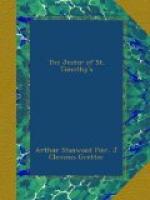“I like a man who is decent without trying,” Westby retorted.
Yet whether his nerves were a little upset by the episode or his eye thrown off by the wait, Westby did not do so well in the next round. The trap was set to send the birds skimming lower and faster; Westby missed two out of ten, and was tied for first place with Carroll. And in the final shoot to break the tie, Westby lost.
He shook hands with Carroll, but with no excess of good humor. He knew he was really the better shot, and even though Carroll was his closest friend, the defeat rankled.
At supper Blake congratulated Carroll across the table.
“You won, did you, Carroll?” asked Irving.
“Yes, sir—by a close shave.”
“I’m sorry I didn’t stay to see it.” The remark was innocent in intention, but to Westby it seemed edged with malice—as if the master was exulting over his defeat.
Something in Westby’s expression told Irving what the boy had inferred; Irving went afterwards to his room in a despondent mood. It didn’t matter how hard he tried or what he did; he had not the faculty of winning and holding affection and respect. As it was with boys, so it would be with men. If only he could see how and why he failed, and could learn to correct his mistakes!
He felt of more importance in the School world when a letter from Lawrence was the first announcement that the Freshman eleven would come to play St. Timothy’s. He asked Collingwood if he had had any word, and when Collingwood said no, he told him his brother’s message.
“I don’t believe there can be any mistake,” said Irving. “He writes that it was decided only the night before. You’ll probably receive the official communication in a day or two.”
Collingwood was tremendously elated. “I knew we were better than Lakeview—but I was afraid they wouldn’t realize it,” he said. “Now we’ll have to get ready and beat them. Anyway, if we can’t do that, it will be the best kind of preparation for the St. John’s game.”
The official communication arrived; Collingwood rushed with it to the bulletin board in the Study building and posted it for all eyes to see. The same day he posted the School eleven, as it would line up in that game.
Westby was to be first substitute for Dennison at right half back. Westby had been playing a streaky game on the First Corinthians; on some days he was as brilliant a runner and tackler as there was in the School, and on other days he would lose interest and miss everything.
If he was disappointed at the preference given to Dennison, he did not show it; in fact, that he appeared on the list as substitute seemed to fill him with elation. He had never taken football quite so seriously as some of the others—as Collingwood and Dennison, for example; and therefore only a moderate success in it was for him a matter of gratification.
The training table was organized at once, but Westby was not admitted to it. There was not room for the substitutes; they were expected to do their own training. Westby was notoriously lax in that matter and had to be nagged constantly by Collingwood, whom he found some pleasure in teasing.




